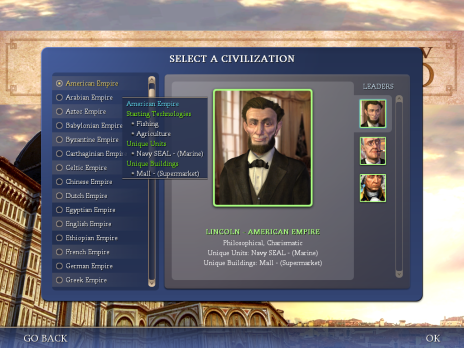Good evening again fellow Civilization players.
Today I’m going to reflect on the several different diplomatic treaties you can usher with other civilizations in Civilization IV; Beyond the Sword. You cannot play a game of Civilization IV without ever having to worry about the numerous diverse diplomatic aspects of the game. And I myself would even have to say that these momentums are what make the game so intriguing.
There are a diverse range of diplomatic treaties built in to the game, to make it appear more realistic. These treaties and diplomatic moves are up for negotiation in the game’s “diplomacy screen” and include the following settlements; trading, an open borders agreement, permanent alliance pacts, defensive pacts, and proposes of others to imply embargos or declare war to others.
To start off, you have the various options of trading with simple commodities, resources and technologies. Even though this does not really have to be a diplomatic move, it does anyhow affect the civilizations or nations diplomatic relations. Besides from being a realistic aspect to the game, I believe that this is a very interesting feature. It means that you have to think through your every move or trade with other civilizations.
To draw an example from the game; let’s say you’re currently in a game with a very divided diplomatic landscape. Your opponents have clearly selected their enemies and allies. In such a diplomatic landscape you have to tread carefully to avoid annoying or irritating someone by mistake. If it occurs that you for example trade techs or even hand them out for free to a civilization, it will leave a negative impression on the opposed civilization and their allies, which leads to a narrower range of diplomatic or economic trade options with the opposed civilization at later events, and if it happens a lot it may even trigger a war.
These sanctions relate a lot to the real world were trade plays a big-, or some might even proclaim that trade or business plays the role in international diplomacy, even though the step to go to war is a lot higher than in the game.
Following; you have the option to impose an embargo with other civilizations, or to propose a suggestion that one of your allies should impose an embargo with another civilization. An embargo in an early stage of the game can have a great impact on a civilization’s development, and may lead to that the civilization is left behind technology-wise which thereafter may lead to a game loss.
This reflects in a great manner how embargos can have great affection on a country’s economy. America’s current embargo with Cuba is a great example on how an embargo affects the economy in a negative direction.
In the real world most Nations operate with open borders to a certain extent. Open borders are necessary to maintain the growth and development of a modern community both economic and culturally. In the real world it is a severe step to close the borders and the world community would most likely show a political pressure to negotiate a resolution. In the game on the other hand, you always start out with closed borders. This gives you another card to negotiate with, but it’s always positive to engage in an open borders agreement because it gives you an easier base for later negotiations.
By some reason the game manufacturers included a “permanent alliance pact” in the game. This is something you’ll in my opinion probably never see in the real world, at least not in my time. Not because not everyone doesn’t want world peace, but because the term “permanent” never goes well in international negotiations in the real world. Diplomats may agree, but at some point someone will break the treaty, simply because it lies in the human’s nature.
Anyhow, it’s an option in the game. It allows civilizations to share technologies, resources, enemies, and allies. Once you’ve entered a permanent alliance, you can’t break it, and you can only form one during a game.
The closest things we have in the real world are different unions, but history shows that they break up after some time. For example Norway was in union with Denmark for over 400 years, but it was the whole time characterized by the fact that Denmark suppressed Norway in a greatly manner which (apparently) wasn’t sustainable.
Defensive pacts represent a terrific diplomatic treaty. It gives you the opportunity to focus on the development of your civilization instead of warfare and helps sustain a peaceful world community. Defensive pacts do also represent a wide usage in the real world, especially in diplomatic unstable areas. History tells us that defensive pacts have saved the global society for the loss of thousands of lives by preventing the outbreak of a war.
So to conclude my post; civilization has included a various range of relevant diplomatic opportunities.
Erlend Søraas, Nordahl Grieg videregående skole, 07.11.2012



